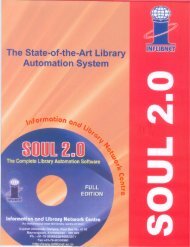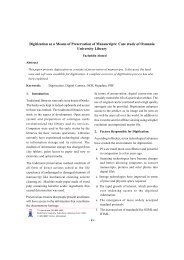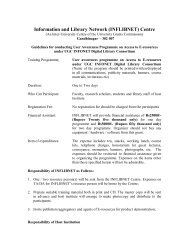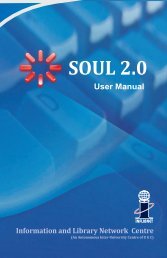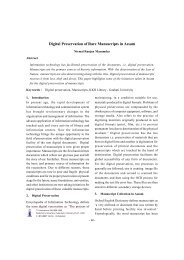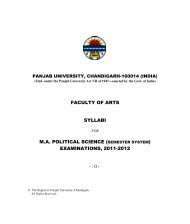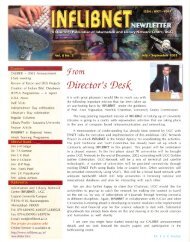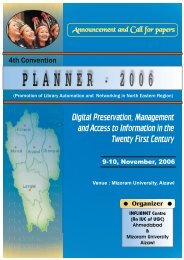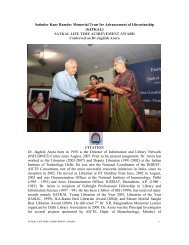Vol.19- No.1 (Jan-Mar, 2012) - INFLIBNET Centre
Vol.19- No.1 (Jan-Mar, 2012) - INFLIBNET Centre
Vol.19- No.1 (Jan-Mar, 2012) - INFLIBNET Centre
Create successful ePaper yourself
Turn your PDF publications into a flip-book with our unique Google optimized e-Paper software.
•• earnlnISSN : 0971-9849Vol. 19, <strong>No.1</strong> (<strong>Jan</strong>uary to <strong>Mar</strong>ch <strong>2012</strong>)INFLIINETEWSLEnERPage ·19Feature ArticleE-lanIng Content IlIi'eIDIrn.-.IIIld HaltIngAblliIIIek Ku ... nt JagIIIh AroraEditorial BoardDr. Jagdish AroraSOUL HelplineTel. : 079 - 26300007N-LIST (E-resources for College)http://nlist.inflibnet.ac.in<strong>INFLIBNET</strong> Bloghttp://www.inflibnet.ac.in/blog<strong>INFLIBNET</strong> Forumhttp://www.lnllibnet.ac.ln/forum<strong>INFLIBNET</strong> Wlklhttp://www.inllibnet.ac.iniwiki<strong>INFLIBNET</strong> Chathttp://www.inllibnBt.ac.in/chat
PAGECONTENTS1. From the Director's Desk2. National Convention/Workshop/Seminar8th PLANNER 201 2. Sikkim University. <strong>Mar</strong>ch 1-3.<strong>2012</strong>National Workshop on Creation and Management of Digital Co[ection. IN FUBN ET <strong>Centre</strong>. February13-17.<strong>2012</strong>National Seminar on "Managing ElectronicTheses and Dissertations".JNU. <strong>Mar</strong>ch 22-23. <strong>2012</strong>10. E-PG Pathshala: INFUBNET <strong>Centre</strong> to Coordinate the Activity of Content Creation in 77 Subjects at PGLevel11 . Knowledge Consortium of Gujarat (KCG) Signs MoU with IN FLIBN ET <strong>Centre</strong>12. Bulk Order for SOUL Software from Commissioner of Higher Education. Govt. of Gujarat for 9Government Co[eges in Gujarat12. IRTPLA Training ProgrammeManonmaniam Sundaranar University. <strong>Mar</strong>ch 26-30. <strong>2012</strong>13. Training Programmes on SOUL 2.0 atthe IN FLIBN ET <strong>Centre</strong>1 OOth SOUL Training Programme. <strong>Jan</strong>uary 30- February 3.<strong>2012</strong>101 stSOUL Training Programme. <strong>Mar</strong>ch 12-16. 201 215. User Awareness ProgrammesNorth Maharashtra University.Jalgaon.<strong>Jan</strong>uary 19. <strong>2012</strong>Mahatma Gandhi University. Kottayam.<strong>Jan</strong>uary 20. <strong>2012</strong>Sree Narayana Guru Co[ege (SNGC). Coimbatore. Tamil Nadu.<strong>Jan</strong>uary 21.<strong>2012</strong>St. Joseph College of Education forWomen.<strong>Jan</strong>uary 28.<strong>2012</strong>Bhagat Phool Singh Mahila Vishwavidyalaya. Sonipat. Haryana.<strong>Jan</strong>uary 31 . 201 2Nagarjuna Government Co[ege. Nalgonda. Andhra Pradesh. February 3. <strong>2012</strong>1 8. Universities who Signed MoU with IN FLIBN ET <strong>Centre</strong> for Shodhganga1 8. RepubUc Day Celebration19. Feature Article22. Onsite / In-house Training Programme on SOUL 2.023. Visitors24. Staff News25. <strong>INFLIBNET</strong> in Regional News
From the Director's DeskA wide variety of c.rric.lahasedcontent targeted to the.ndergrad.at e andpostgrad.ate st.dents incolleges and .niversities arenow availahle thro.gh an.mher of independentplatforms, s.ch as Sakshat(ktp:f I www.saktlDt .a.~. NPfD.(http://nptel.iitm.ac.in), 1-- ~anko5h (http://egyanlroiih.ac.in),ac (httpfl :www•• gc-cec.ac.in). etc. Seveml of these initiativesare r.oded hy the National Mission on m.cation thl'O.gh ICf,Ministry of HlIJIlan ReilO.rce Development (HURD).However. most of the content that are availahle on the platfonnsmentioned above are "static" in nat.re and text-heavy, devoidof interactivity, hells and whistles that can he h.ilt into digitalcontent .sing tools and teclmiq.es of new ICfs. s..ch textheavycontent or video recordings of lect.res do not qulif'y tohe a good candidate for e- content. Fd.cational materials inthese formats do not offer interactivity and thu do not en:-.rest.dent participation. As -.ch, they fail the most critical test oflearning content effectively. lhmhination of text, graphics.animation, video and interactive q.izzes is a hetter approach.The hest fonn of learning is where the st.dent is kept engagedthro.gh the proceilS of imparting ed.cation. In the traditionalclassroom sitution, there are a nllJllher of ways to asseilSwhether or not st.dents are actully assimilating instr.ction,e.g. the teacher may pose q.estions or cond.ct formalasse_entsto g_ge the level of OIderstanding of each st.dent.Likewise, for an online learning session to he effective, theco.rseware m.st inel.de interactive feat.res that facilitate"immersive learning". This might he in fonn of "interactiveelements" that st.dents can engage with as they progreilSthro.gh the conceptul learning materials. or it may he a f.lIfledgedsim.lation that tests hoth OIderstanding and skills withinthe context. Moreover, all content m.st he f.11y so)RM-2004(Shamhle lhntent Object Reference Model) compliant to allowinteroperahility and consistency. Learning content :dlO.ld hemod.lar to enco.rage mix-and-matching of existing contentand sho.ld he designed .sing the latest standardisedtechnologies. :-.ch as HTML 5, ~ etc.The most effective digital learning content is one where theknowledge of the 'tIomain expert" is married to the m.himediaskills of weh designers and inill r.ctional designers iIO as to en:-.rethat high- q.ality uuiulllJll and demand- hased interact ivecontent incorporat ing graphics, animation, sim.lat ions,assignments. q.estion hank, q.izzes. etc., are created hy thecompetent :-.hject experts with aid of weh and graphic designers.As :-.ch, to f.11y levemge the henefit soffered hy new ICf, contentcreation teams m.st compriille of domain experts. weh deilignersand instr.ctional designers. Working collectively, :-.ch teamswill he ahle to conceptllalise innovative approaches to developingcontent that wo.ld f.11y engage .sers with interactive digitalcontent.The INFLIBNEf (Htre has recently heen assigned the tailk ofcoordinating the activity of content creation at poillgrad.atelevel in 77 -.hjects. While services of :-.hject coordinators. papercoordinators and content writers in heing engaged as domainexperts to write textul cont ent along with script to incorporatem.ltimedia, the INFUBNEf (Htre wo.k1 take the reilponSl"hilityof enriching theille content with m.lti-media and hosting themon to so)RM-complaint digital repoilitory. The (Htre alreadyhasthe desired expertise in weh interface deiligning. We, however,wo.ld he req.ired to develop the req.isite expertise inm.ltimedia either hy training the exiilling manpower or hy hiringthem. Part of the activities can also he o.tso.rces to the johhers.The topic of the c.tting- edge teclmology in US in this i .. e is"E- learning" hy Shri Ahhimek Klunar and Dr. -"gdim Arora.Major activities d.ring the qurter Older report incl.des ~ 8thPIANNFR <strong>2012</strong> at Sikkim University from li11 to 3rd <strong>Mar</strong>ch,<strong>2012</strong>; i~ National Seminar on Managing FJectronic Theses andDissertations at jliU, New Delhi flOm 22 -2 3rd May, <strong>2012</strong>; ii~IRfPLA at Manomnaniam s.nda.mar University, TirllJlelveli from<strong>Mar</strong>ch 26- 30, <strong>2012</strong>; iv) 100th and 101st SOUL TrainingProgrammes at the INFLIBNEf (Htre from.Jm. 30 to Feh. 3 ,<strong>2012</strong> and from <strong>Mar</strong>ch 12 to 16, <strong>2012</strong>; and v) UGC-INIONEfI NUSf Uiller AwareneilS PlOgGUllmes in 5 lIJIiversities I colleges.The hegiIming for the year <strong>2012</strong> was marked with signing ofMoU with the Knowledge OmsortillJll of Gtjarat (Klq for NUsras well as for OJ\S. Thro.gh these MoUs. the INRJBNEf wo.ldhe extending acceilS to e- reilO.rces to 936 colleges in Gtjaratand wo.ld p.hlim KCG's flagship jo.mals on OJ\S in openaccess. This iSMle also hemlds the heginning of the new-year aswell as the new financial year which hrings lot of new activitiesto the (Htre. We wi. a very happy and plOspero.s new yearto all o.r readers.Uagdish Arora)Vol. 19, <strong>No.1</strong> Uanuaryto <strong>Mar</strong>ch <strong>2012</strong>)---------------------------------- 1
National Convention/Workshop/Seminar8 t h PlANN ER 20 12. Sikkim University. <strong>Mar</strong>ch 1 -3. 2 0 12InauguraL Session1be 8th PlANNER <strong>2012</strong> (Promotion of library Automation andNetworking in North Eastern Region) was organised by theINFLIBNEf Centr. at Sikkim Uoiv.roity. Gwtgt.k fr.m 1st t.3td <strong>Mar</strong>ch <strong>2012</strong> Oft the theme 'Buildiftg Participatory LibraryServices in Digital Era", in collaboration with the Sikki.Uruver:§ity, Gaagtok. lbe ftlaio theme of the coaveatioft wasdivided into three .. b- themes, namely i) Rlrticipatory Web Tools;ii) Academic Libraries in Participatory Era; and iii) BuildingIofrastructure for Patticipatioft. Ioaugural Sessioft of theCooveotioft was held at Sikkim Maaipal Iastitute of MedicalSciences on 1st <strong>Mar</strong>ch <strong>2012</strong>, aU the remaining se';OftS wereh.ld at H.t.1 _D.Iak •• n 2nd and 3rd <strong>Mar</strong>ch <strong>2012</strong>. Th.Conventi.n w ... att.nd.d by 305 del.gat •• and invit ••• fr.mallover the coamey. II publishers participated io the exhibitioftarranged as Pa't of the OJftveotioft. Out of 95 su.bftlMo~ 51papers were selected for presefttatioft rutd 17 papers wereselected for poster preseatatioftS.Dr, Tamal Kumar Guha, Librarian, Sikk im University andOrganizing Secretary for the 8th PLANNER 201 2, welcomedthe dign itaries on the da is as well as guests and the part icipants,Dr Jagd ish Arora, Director, INFLIBNEI' (Ratre deliberated oa theactivities aad services of the INFLIBNEf (Ratre with ~eclalrefereace to NE Iadia. De (baveatioa was iaaugwated by ProfMaheadta P Lama, Vice Oaaacellor, SiJddOl Uaivei'Sty. Prof. Lama,in his inaugural ..... ch. empha
TutorialsPre- convention tutorials were delivered on 'NLIS[, Shodhganga" and 'SOUL 2.0" on 1M <strong>Mar</strong>ch <strong>2012</strong> for the benefit of participantsof the Convention. the tutorials on 'NLISf: E- resowces for Colleges II: Shodhganga: A Reservoir of Indian theses" was presented byShri Manoj Kwnar K, Scientist D (CS}, INFLIBNEl' <strong>Centre</strong>, and 'SOUL 2.0" was presented by ~i 13trik Patel, ScientiM D (~,INFLIBNEl' <strong>Centre</strong>. 150 delegates attended tutorials.Technical SessionsThe following theme papers were presented by invited theme speakers during the Technical Session:Sl.No Theme Topic Theme Speaker1 Participatory Web Tools Web Scale Discovery Tools Sh Prem Chand, Librarian,lIAS, Shimla2 Academic Libraries in Academic Libraries in the Dr B B Sahoo, Assistant Librarian,Participatory Era Participatory Age lIT DelhiDeleqate, of the 8'" PLANNER <strong>2012</strong>There were 6 technical sessions held during three days wherein 33 papers were presented on various themes as !=€r the details givenbelow:Sessions Theme (hai rpe rson (0- c ha i rm a n/Ra pporte u r No of paperspresentedSession 1 Participatory Web Tools Dr MS Rana Ms Jyoti Bhatt 5Session 2 Academic Libraries In Participatory E,o Prof Prava ka r Rath Dr M S Lohar 5Session 3 Academic Libraries In Participatory Eeo Dr Khomdon Singh D, Neeraj Kumar 4Session 4 Academic Libraries In Participatory Eeo Dr T Temjen D, Lalria masa mi 7Session 5 Building Infrastructure for Participation Dr Mukesh Saikia Dr S K Singh 7Vol. 19, <strong>No.1</strong> Oanuaryto <strong>Mar</strong>ch <strong>2012</strong>)------------------------------ 3
Panel Discu~onA panel discussion on the thelDe of the Convention 'BuildingPartidpatory Library Servit:'es in Digital Ira" was organized priorto the t:'ont:'Ju.ding session of Convention. Dr. Jtgdish Arora,Diredror, INFUBNEf <strong>Centre</strong>, cltaired the panel dismssion withDr A R D Prasad, Profe .... r, DRIC, Bangalore, Dr R K Oladha,jliot Se
• Digital collection h.ilding ning OSpace: Workflow"S.hmissions• IPR and Sec.rity aitpects of IR• Weh 2.0 and Social Networking• Lihrary A.tomation and latest trends in ICf• Access to e- reso.rces s.hscrihed .nder differentconsorti.mDr. Anil Klllnar. Librarian, OM, Alanedahad, Dr. Shailem Yagnik,Liblarian, MIO\., Alanedah.:l, Dr. lbgendra Singh, Lihrarian,DT Roorkee and Dr. T S K.mhar, Librarian, lIT Gandhinagar,Shri Manoj Kunar K, Scientist 0 (£S), Sh Amok Kunar Ra.i,Scientist- O(£S) Sh Yatrik Patel, Scientist- O(£S) were thereso.rce persons for the Work_po Shri P Kannan, ScientistB (IS), Shri Swapnil Patel, Scientist B (£S), Shri Vgay Shrimali,Sf A (£S) and Shri Imran Man.ri, Project Officer (IS) werereso.rce persons in the practical session. Shri latrik Patel,Scientiilt 0 (~and Shri H GHosamani, Scientiilt C(IS) Coordinatedthe workshop. 20 participants fl'OOl different parts ofthe colllli:ry attended the work_poProf. Sudha Pai, Rector, JawaharLaL Nehru University, New DeLhiLighting the TraditionaL Lamp during inauguration the seminaraLong with Dr. Jagdish Arora, Director, Dr R. C. Gaur, UniversityLibrarian, and Dr. Dev Swaroop, Joint Secretary, UGC.the event as well as to examine and evaluate the prosress madeand stratesies for promotins Shodhsansa durins the meetins,The two-day seminar was focused on t he potential of electronict heses and dissertations and methodoloSY to manase them, TheSeminar provided a national forum for academicians, researchers,practitioners, librarians and policy makers to deliberate upont he issues pertainins to manasement of electronic theses anddissert ationsThe Seminar was inausurated by Prof.Sudha Pai, Rector,Jawaharlal Nehru University, New Delhi Prof Pai elaborated onthe importance of theses and dissertations as primary source ofinformation and said that a policy needs to be evolved fordisitizins and preservins the theses and dissertations for futureParticipants of Creation and Management of DigitaL CoLLectionwith the Director and TechnicaL Staff of the <strong>INFLIBNET</strong> <strong>Centre</strong>NationaL Seminar on ·Mana~in~ ELectronic Theses andDissertations', JNU, New DeLhi, <strong>Mar</strong>ch 22-23, <strong>2012</strong>The National Seminar on Manasins Electronic Theses andDissertations (ETDs) was orsanized by Central Library, JawaharlalNehru University, New Delhi, in collaboration with the <strong>INFLIBNET</strong><strong>Centre</strong>, Ahmedabad on 22 nd and 23 rd <strong>Mar</strong>ch, <strong>2012</strong> atJNU, NewDelhi This Seminar was first of its kind since it was exclusivelydevoted to manasins electronic theses and dissertations,TheMeetins of the <strong>INFLIBNET</strong>'s National Committee on ETDscoincided with this event enablins members to participate inneeds Dr R,C,Gaur, University Librarian, save an account ofinitiatives taken at the JNU for creatins an ETD archive, Dr, DevSwaroop, Joint Secretary, UGC, opined t hat theses anddissertations should be preserved for posterity and madeaccessible to the scholarly community, He said that the need oft he hour is to formulate policies in order to handle issues ofIntellectual Property RiShts (IPR), plasiarism and lons-termpreservation He promised whole-hearted support of the UGCto Shodhsansa initiative taken by the <strong>INFLIBNET</strong> <strong>Centre</strong>,Dr JaSdish Arora, Director <strong>INFLIBNET</strong>, elaboratins onShodhsansa initiative hiShlishtins the benefit of providins accessto theses and dissertations in open access mode Dr Arorainformed the dele sates that UGC has mandated electronicVol. 19, <strong>No.1</strong> Uanuaryto <strong>Mar</strong>ch <strong>2012</strong>)---------------------------------- 5
submission of Ph.D theses vide UGC Regulation 2009 (minimumstandards and Procedure for award of M.Phil / Ph.D Degree).Accordingly, all universities are required to submit electronicversion of theses into Shodhganga. He mentioned that theuniversities are also free to set-up their own ETD repositorieswith help of IN FLIBN ET <strong>Centre</strong>. Dr. Arora mentioned that theIN FLIBN ET <strong>Centre</strong>, under the Shodhganga initiative, will provideanti-plagiarism software to universities that are signatory to theMoU on Shodhganga to facilitate detection of plagiarism in thetheses before its submission to the University.Dr. Vinod Chachra gave a bird's eye view of initiatives taken atthe international level for creating and managing ETDs. He opinedthat free and open access should be provided to theses anddissertations submitted to the universities across the gtobe. Heexplained different steps involved in creating and managingETDs. He emphasized that the tools used for creating andmanaging ETDs should be scalable in nature, the discovery toolsneed to be enhanced so as to provide greater visibility to theETDs. He also discussed the features of NDLTD Union Catalogue,phases of its development and OAljPMH protocols used forharvesting the metadata from member universities. He elaboratedon strategies used for promotion, adoption, creation,dissemination and preservation of ETDs by the N DLTD andhighlighted the use and importance of VALET, an open source,customizable, web based interface that enables remote users tosubmit content to FEDO RA based digital object repository. Dr.Chachra also observed that more concerted efforts need to betaken to evolve a strategy for long-term preservation of ETDarchives. Sh. Manoj Kumar K extended a warm vote of thanksto the delegates for turning up in large number as well asdignitaries and experts for their time and support. He alsoexpressed gratitude to the Vice Chancellor, Rector and otherauthorities of JNU for hosting the National Seminar.Technical sessions were organised in six different tracks namelyi) ETD: Policy Setting and enforcement; ii) Shodhganga: CentralRepository of Electronic Theses and Dissertations; iii) Digitizationand Digital Archiving of Theses and D~sertations; iv) ETD SystemsSelection and Use; v) ETD: Case studies; and vi) Copyright andOther Related Issues concerning ETDs.Technical Session - I ;ETDs; Policy Settin'l' and EnforcementChairperson: Sh. Subhash Deshmukh, University Librarian,GGSIP, New DelhiRapporteur: Dr. Anup Kr. Das, jNU, New DelhiDr. Dinesh Katre, in his presentation, highlighted the objectivesof National Digital Preservation Programme that includesconducting research and development in digital preservation,develop pilot digital repositories, define digital preservationstandards and provide inputs to Department of IT for layingdown national policy and strategy for long term preservation.He dwelt on the importance of long-term preservation ofscholarly content. He highlighted that not only final output ofthe theses and dissertations be archived and preserved but thesoftware, raw data, artefacts used for arriving at the final outputor findings should also be preserved and made accessible tofuture researchers so that duplication of efforts and dissipationof energy can be avoided. Dr. Katre elaborated on the initiativestaken at the international level for digital preservation likeNational Digital Infrastructure and Preservation Programme(NDIIPP, USA), NESTOR (Network of Expertise in Long TermStorage of Digital Resources, Germany; CASPER (Cultural. Artisticand Scientific knowledge for Preservation, Access and Retrieval.UK), Digital Preservation Europe (DPE), Digital Curation <strong>Centre</strong>(DCC).Dr. ARD Prasad, DRTC, Bangalore presented a comparativeanalysis of metadata schema used by NDLTD, UKETD,Shodhganga of IN FLIBN ET and demonstrated visible variationsin all the three schemas. He mentioned that there is no W3standard available for ETDs. Dr. Prasad advocated that thereshould be a single standard metadata schema which should beuniformly followed by the ETDs across the country. He suggestedthat the metadata schema should be amenable for crosswalkwith ETDMS and U KETD- DC and should be exposed to theWeb for validation. He opined that the use of standard metadataschema will definitely improve interoperability among themetadata schemas and facilitate conversion and exchange ofmeta data and enable cross domain meta data harvesting andmetadata searches.Technical Session - II; Shodh'l'an'l'a;An Dpportunity for University Libraries in IndiaChairperson: Dr. jagdish Arora, Director, IN FLIBN ETRapporteur: Mr. Gulam Rasul. jNU, New DelhiMr. Manoj Kumar K, Scientist-D (CS) explained the objectives,coverage and submission workflow of Shodhganga. Heexplained that Shodhganga is an open access re[X)sitory of thesesand dissertations submitted to Indian universities as per the UGCNotification (2009). It serves as platform for the research scholarsto de[X)sit their Ph.D theses and make it accessible to the worldwide community of scholars in open access mode. The research6 -----------------------------Vol. 19, <strong>No.1</strong> Uanuary to <strong>Mar</strong>ch <strong>2012</strong>)
scholars, university representatives or research supervisors maysubmit theses to Shodhganga by registering themselves onShodhganga. He explained that the universities are required tosign an MOU with IN FLIBN ET <strong>Centre</strong> in order to join andparticipate in Shodhganga programme. This MOU delineate theresponsibilities of individual universities and <strong>INFLIBNET</strong>. Bysigning the MOU, universities are entitled to get funds fordigitizing and archiving their old theses, get access to antiplagiarismsoftware and deter plagiarism of scholarly content.Shri Manoj Kumar also described a complementary initiativecalled Shodhgangotri that provides for submission of electronicversion of approved synopsis submitted to the universities forregistering the students in Ph.D programmes. He clarified thatShodhgangotri intends to highlight the trends and directions ofresearch being conducted across the country, thereby preventduplication of research. Once the Ph.D degree is awarded andthe full-text thesis is submitted to Shodhganga, a link to thefull-text would be provided from Shodhgangotri to Shodhganga.Technical Session - III: Di'l'itization and Di'l'italArchivin'l' of Theses and DissertationsChairperson: Prof. Karmeshu, Dean, SCSS, jNU, New DelhiRapporteur: Mr. Amar Singh Yadav, jNU, New DelhiProf. Uma Kanjilal made a detailed presentation on IGNOU'sinstitutional repository called "E-Gyankosh", web casting facilityfor Gyandarshan I & II and Gyanvani. She mentioned that theinstitutional repository was started in 2005 to store, index,preserve, distribute, share the distance learning resources. Itprovides access to 95% of the self instructional materialproduced by the university, metadata links to 1600+ videoprogrammes available on You Tube and has more than 1.5 millionregistered users. The repository gets 400 visitors daily. Shementioned that the flexi-learn programme of the universityenables users to access free and open courses. The students canregister and explore the courses, their content. and coverageand thus gain knowledge and skills in any course of their interest.She mentioned that the University follows OER (open EducationalResources) policy like other organizations at international levelsuch as MIT http://web.mit.edu/education/, Open Universityhttp://openlearn.open.ac.uk/, CO L,U N ESCO ,0 LI-CM U, RiceUniversity, etc. Prof. Kanjilal discussed the barriers to 0 ERmovement across educational institutions-issues of copyright.file formats of learning resources, standard metadata and theirinteroperability.Dr.T.S. Kumbar, Librarian, lIT. Gandhinagar highlighted variousETD initiatives taken at national and international levels includingIndCat (Theses Database), Vidhyanidhi, DELN ET. NASSDOC.openMed@NIC, Librarian's Digital Library, Open Index initiative,NDLTD, DART. Diva, PQDT Open, EThOS, Theses Canada, ADT.dissertations Online, NARCIS, etc. He also elaborated on ETDdiscovery tools like DOAR- Directory of open Access InstitutionalRepositories, OAlster worldCat. scientificcommons.org, BASE:Bielefeld Academic Search Engine, CASSIR: Cross archive SearchService for Institutional Repositories. Dr. Kumbar identified 48indicators based on the survey conducted among libraryprofessionals in the country, which could be used for setting upand maintaining ETDs. He also ranked ETDs according to theratings given by experts in the library field based on theseindicators.Dr. S. Majumdar elaborated upon the potential of ETDs andinitiatives taken at national and international levels such asVidhyanidhi, Indian Institute of Science, Indian Council of SocialSciences, NDLTD, ADT. ETD of Brazalian Universities, DARTEurope, Diva, EthOS (UK), National ETD Portal of South Africa,RCAAP, Theses Canada, WorldCAT, etc. He dwelt upon theinitiatives taken by the University of Delhi in creating an ETDarchive from retrospect including 13,000 M. Phil and 15,000Ph.D theses. He mentioned that the project was undertaken bythe University in two phases. In the first phase, all the thesesthat were submitted from inception of the university up to 1979were digitized and in the second phase all the theses submittedfrom 1 980 to 2003 were digitized. Dr. Majumdar expressedconcern over many challenging issues related to setting up andmaintenance of ETDs like quality control over content. adoptionof standard metadata schema, file formats, long-termpreservation strategy, standards for providing bibliographicalreferences, etc. He expressed that the user community need tobe sensitized to the practice of anti-plagiarism, fair use andintellectual property rights.Technical Session - IV:ETD Systems Selection and UseChairperson: Dr. H K Kaul. Director, DELNETRapporteur: Mr. Somesh, jNU, New DelhiDr ARD Prasad dwelt upon OAl-ORE (Open Archives InitiativeObject Resuse and Exchange) implementation to DSpacerepositories. OAl-ORE defines standards for the description andexchange of aggregations of web resources. (http://www.openarchives.org/ore). He mentioned that thisimplementation will enable IN FLIBN ET to collect digital objectsfrom re[X)sitories across the country.Vol. 19, <strong>No.1</strong> Oanuary to <strong>Mar</strong>ch <strong>2012</strong>) ------------------------------- 7
ights, performer's rights, multimedia rights, moral rights ,whichalso include right of paternity and right of integrity, convergencerights. He emphasized that technology is a double edged swordas it offers new means to fix the original expression in a tangibleform and at the same time supports copyright infringement.The Internet activities of caching, browsing, mirroring, scanning,downloading, uploading, file swapping, tantamount to copyrightinfringement. The laws and rules on 'fair use' are not very clearlydefined and are a little ambiguous.Technical Session - VI:Copyri'l'ht and other related Issues concernin'l' ETDsChairperson: Dr. Usha Mujoo Munshi, Head,Library, IIPA, New DelhiRapporteur: Mr. Tariq, jNU, New DelhiThe copyright amendment Bill 2010 (still pending beforeParliament), in order to protect copyright of authors hasproposed various provisions like technical protection, digitalrights management. Mr.Vakul advocated that copyright billshould allow libraries, archives, museums to convert copyrightprotected material into digital format for preservation and futureuse. Furthermore, the libraries should be allowed to facilitateuse of copyright material for academic and educational purposes.He also highlighted that digital copying is a civil and criminaloffence according to Information Technology Act 2000. If aperson downloads copies of a document without seekingpermission of the owner, he is liable to pay a compensatoryamount of Rs 5 Crores to the owner and may be sentenced toimprisonment for 3 years. Mr. Sharma reiterated that librariesand guides/supervisors should use anti-plagiarism software toprevent substantial copying and other fraudulent practices; highereducational institutions must develop a code of conduct forstudents, researchers and guides. Mr. Sharma also mentionedthat substantial copying from material which are out of copyrightshould also be seen as copyright infringement. The usercommunity should be sensitized towards the provisions of theCopyright Act and Information Technology act.that these theses were sent for Shodhganga @<strong>INFLIBNET</strong>. TheUniversity of Pondicherry has already signed an MOU with<strong>INFLIBNET</strong> <strong>Centre</strong>. The University also subscribes to 'TURNITIN'which is an anti-plagiarism software. The research scholars aresupposed to subject their theses to TURNITIN software beforesubmitting them for award of degree. The University providesNo-due certificate based on TU RNITIN Document ID.Panel Discussion: Preservation and Access of Thesesand Dissertations: Issues and Challen'l'esOn the concluding day, a panel discussion was held with variousexperts expressing their suggestions to embark up on the ETDprojects in universities, issues and challenges for preservationand access to ETDs and strategy for enrolling more universitiesand other institutions into Shodhganga project. Discussions werealso held regarding incentives to universities and research scholarsfor submission of their theses in the Shodhganga. The panelwas chaired by Dr. jagdish Arora and panellists were Dr. R KChadha, joint Scretary, Lok Sabha, Dr. Samyuktha Ravi, UniversityLibrarian, Pondicherry University, Dr. Nutan Johry, Dy. Director,NASSDOC New Delhi, Sh. N V Sathyanarayana, Mis. InformaticsIndia Pvt. Dr. 5 K Arora, University Librarian, IGNOU, New DelhiLtd, and Dr. Debal C Kar, University Librarian, Dr. BRA University,Delhi.Dr. R Samyuktha made a presentation on issues and challengesof ETD Initiatives at University of Pondicherry. Dr. Nutan johrymade an elaborated on the role of ICSSR in preservation andaccess to theses and dissertations. Mr. N V Sathyanarayan,Informatics India Pvt. Ltd expressed his views on marketing ofIndian theses and dissertations. Dr. S K Arora, University Librarian,IGNOU, New Delhi made a presentation on preservation andaccess to theses and dissertations at IGNOU. Dr. Debal C Kar,University Librarian, DR BRA University, Delhi presented initiativestaken at the BRA University regarding electronic submission oftheses and dissertations.Valedictory Session and RecommendationsDr. R. Samyuktha, University Librarian, Pondicherry Universitypresented a case study of institutional re~sitory for archivingtheses and dissertations that was set up in Pondicherry University.She gave an account of automation and digital library activitiesof University Library. She mentioned that the institutionalre~sitory was set up in 2010 using DSpace. The digitizationof the theses was done in- house as \l'v€ll as outsourced. Thelibrary has already digitized and uploaded 574 theses whichare in Engtish, French, Sanskrit. Hindi and Tamil. She mentionedValedictory Session of the National Seminar on was held on23rd <strong>Mar</strong>ch <strong>2012</strong> at 3.30 p.m. Dr. Manorama Tripathi,Rapporteur General of the Seminar presented the report onvarious sessions held during the Seminar. In her report. Dr. Tripathipresented a gist of lecture delivered and discussions held invarious sessions. In his concluding remarks, Dr. Jagdish Arora,Director, IN FLIBN ET <strong>Centre</strong> informed the participants aboutvarious decisions taken in the meeting of the National Committeeon ETD for Shodhganga. He informed that the CommitteeVol. 19, <strong>No.1</strong> Oanuary to <strong>Mar</strong>ch <strong>2012</strong>) ----------------------------- 9
discussed about the grant to be given for digitization of thesesand dissertations as \l'v€ll as for setting up of ETD laboratories inuniversities signatory to the Shodhganga initiative. TheValedictory Address was delivered by Dr. R.K. Chadha, jointSecretary, Lok Sabha, New Delhi. Dr. Chadha, in his address,congratulated the jNU Library and <strong>INFLIBNET</strong> <strong>Centre</strong> fororganizing the National Seminar of ETD.He also suggestedthat such seminars should be organized in all parts of the countryto generate greater awareness regarding open access to electronictheses and dissertations. Dr. Ramesh C. Gaur, University Librarian,JNU extended a warm vote of thanks to his staff, authoritiesand <strong>INFLIBNET</strong> <strong>Centre</strong> for help and support in organization ofthis Seminar.He informed the participants that all thepresentations of the Seminar will be made available from theWeb sites of jNU Library and <strong>INFLIBNET</strong>.Major recommendations made during the seminar were asfollows:1. Open access of electronic theses and dissertations will benefitboth university and researchers. As such, universities shouldbe encouraged to set-up their own ETD repositories topreserve as well as expose their intellectual properties to theworld-wide community.2. The role of <strong>INFLIBNET</strong> in ETD initiative, especiallyShodhganga, was well appreciated. It was proposed that alluniversity libraries in India should join Shodhganga as soonas [X)ssible.3. Availability of theses and dissertations in electronic formatwill be a deterrent to plagiarism and will improve quality ofresearch work in India.4. The <strong>INFLIBNET</strong> <strong>Centre</strong> should take-up initiatives to developa catalogue of all theses and dissertations in India in lineswith the N DLTD union catalogue.5. IN FLIBN ET <strong>Centre</strong> should collaborate with internationalprogrammes such as National Digital Library for ElectronicTheses and Dissertations (NDLTD) and should take initiativesto organised international conference on ETD with theirassociation so as to promote sharing of expertise for mutualbenefits.6. Training programme on digitization, creation of metadata,setting-up and maintenance of digital repository of thesesand dissertations should be organized for library professionalsV'vOrking and user awareness program on ETD for academicadministrators as well as for research scholars should beorganised in various geographical regions of the country.7. Embargo period, in case of theses, should be restricted tominimum, not more than six months in any case.8. The UGC should provide special grant during XII Five YearPlan for digitization and digital archiving of theses anddissertations.9. Research scholars should get incentives for online submissionof his / her theses.10. Digital watermarking and other restrictive technologies shouldbe used to restrict direct copying of theses.11 .The UGC may formulate National IPR policy for ETDs.12.National seminar should be organised at least once in twoyears by inviting experts working on ETD projects.13 .The IN FLIBN ET <strong>Centre</strong> is requested to contact other publicaccess ETDs in India such as ETDs maintained by CISR, ICSSR,Vidhyanidhi etc. for association and hosting of content inShodhganga after signing an MoU so that single platformcan help researchers to search/brovvse and use content easily.•E-PG PathshaLa: <strong>INFLIBNET</strong> <strong>Centre</strong> to Coordinate theActivity of Content Creation in 77 Subjects at PG LeveLThe UGC has assigned the task of coordinating the activity ofcontent creation in 77 subject areas at PG level to the IN FUBN ET<strong>Centre</strong>. The <strong>Centre</strong> is responsible for technical as well asadministrative coordination of this activity. Major tasks involvedin the process are as follows:i) Project set-up and its execution;ii) Selection of subject coordinators;iii) Workflow management from content development tohosting;iv) Set-up a platform for hosting e-content into SCORMcomplaintLearning Management System; andv) Multimedia enrichment of content.The <strong>Centre</strong> has configured A Tutor, an open source LearningManagement System to host the e-content created in theprocess and developing E-PG Pathshala Management Systemto manage the administrative flow of the work. Online interfacehas already been developed that was used for inviting "Expressionof Interest" from subject coordinators.The Director of IN FLIBN ET <strong>Centre</strong> is designated as NationalCoordinator (TechnicaL) for this activity. Prof. H P Dikshit. formerVice Chancellor, IGNOU is designated as National ProgrammeCoordinator for this initiative.•10 -----------------------------Vol. 19, <strong>No.1</strong> Uanuary to <strong>Mar</strong>ch <strong>2012</strong>)
KnowLedge Consortium of Gujarat (KCG) Signs MoUwith <strong>INFLIBNET</strong> <strong>Centre</strong>KnowLed~e Consortium of Gujarat (KCG) si~ns MoUwith <strong>INFLIBNET</strong> <strong>Centre</strong> for N-LISTTh e KnowLe d~ Consortium of Gujarat (KCG) has s i~n e d MoUw ith IN FLIBN ET <strong>Centre</strong> for extendin~ access to e- resources underthe N- LIST Pro~ ra mm e to 83 6 eLi~ible coLLe~es in Gujarat. TheKCG has paid a Lump sum amount to the INFLIBN ET <strong>Centre</strong> asannuaL membership fee for these coLLe~es. Th ese co LLe~es arebeing enrolled under the N LIST programme. Login ID andPassword are being issued to individuaL uses (facuLty. studentsand staff) from here colleges enabling them to access e- resourcesmade accessible through NLIST programme.KnowLed~e Consortium of Gujarat (KCG) si~ns MoUwith <strong>INFLIBNET</strong> <strong>Centre</strong> for OjASTh e KCG has s i ~ n e d an MoU with <strong>INFLIBNET</strong> Ce ntre for hostingits journaL ca lled KCG - Humanities at the OJ AS pLatform. Th eKeG plans to bring out a series of journals in various disciplines.ALL these jou rn aLs wouLd be hosted on the OjAS pLatform as t heyare released.OjAS Now Hosts 13 JournalsThe <strong>Centre</strong> Launched Oj AS (Open JournaL Access System) initiativein the month of january 2009. using the open source softwarecalled Open JournaL System (Oj S). The software is installed atone of t he servers of the <strong>Centre</strong>. faciLitating hosting of electronicversion of journals into open access mode with all processes ofsubmiss ion. pee r- rev iewing, editing, layout des igning andpublishing built into it. The initiative encourages, the unive rsitiesand institut ions t hat are pubLishing journaLs in print format touse t he pLatform for hosting eLectronic version of their journalsfree- of- cost on server at the <strong>INFLIBNET</strong> <strong>Centre</strong>. The initiativealso encourages faculty in universities to start their own openaccess journals on this platform. The 0 JAS hosts the following1 3 journals at present:1 . JournaL of Literature. CuLture and Media Studies - PubLishedby Prof. N D R Chandra. Head. Department of En
BuLk Order for SOUL Software from Commissioner of Hiq'her Education,Govt. of Gujarat for 9 Government CoLLeq'es in GujaratThe Commissioner of Higher Education, Government of Gujarathas procured multiple copies of SOUL 2.0 software to automate80 grant-in aid colleges and 54 Government colleges acrossthe state. The <strong>Centre</strong> has already provided SOUL 2.0 to 125Government colleges, orders were placed for 9 Governmentcolleges recently. The <strong>Centre</strong> organized five days Special TrainingProgramme on SOUL 2.0 Installation and Operations for thestaff of these colleges at <strong>INFLIBNET</strong> <strong>Centre</strong>, Ahmedabad. •IRTPLA Traininq ProqrammeManonmaniam Sundaranar University, <strong>Mar</strong>ch 26-30,<strong>2012</strong>The <strong>Centre</strong> organised Regional Training Program on LibraryAutomation (IRTPLA) in collaboration with ManonmaniamSundaranar University from 26th to 30th <strong>Mar</strong>ch <strong>2012</strong> at theSenate Hall, Manonmaniam Sundaranar University. 36participants consisting of library and information scienceprofessionals from different colleges participated in theprogramme. Dr. P. Balasubranian, Deputy Librarian,Manonmaniam Sundaranar University welcomed the participantsand guests. Dr. S. Manickam, Registrar, ManonmaniamSundaranar University delivered the Inaugural Address. ShriP.Kannan, Scientist B (LS), <strong>INFLIBNET</strong> <strong>Centre</strong> briefed about thetraining programme. Dr. K. Kannan, Assistant Librarian,Manonmaniam Sundaranar University expressed a warm voteof thanks to the participants and guests.Shri P. Kannan represented the IN FLIBN ET <strong>Centre</strong> as a Resourceperson in the training programme. Shri Kannan briefly explainedthe different activities and services of the IN FLIBN ET <strong>Centre</strong>,especially about UGC-Infonet Digital Library Consortium, NLIST. Shodhganga, Shodhgangotri and other programmes ofthe centre. Shri T Venkata Ravi Kiran and Shri M 0 Latheef madepresentations on installation and use of different modules ofthe SOUL software. The presentations made by resource personswere as follows:Name of the ExpertTopic of PresentationDr. K Kannan, Assistant Librarian, Manonmaniam Sundarnar UniversityOpen Access Software and ResourcesDr. R. S. Rajesh, Associate Professor, Department of Computer Scienceand Engineering, Manonmaniam Sundaranar UniversityRecent Trends in Wired and Wireless NetworkDr. M. Surulinathi, Assistant Professor, Department of Library andInformation Science, Bharathidasan University, TrichyDr. P. Balasubramanian, Deputy Librarian,Manonmaniam Sundarnar UniversityDr. A. Thirumagal. Librarian of Manonmaniam Sundaranar UniversityDigital Library its Development & ResourcesComputer Network and InternetBibExcel: Tools for Using Bibliographic References ofJournal ArticlesName of the Experts with their topic of presentationsAt the end of the programme, the feedbacks filled in by theparticipants were collected and certificates of participation weredistributed to the participants. II12 -----------------------------Vol. 19, <strong>No.1</strong> Uanuary to <strong>Mar</strong>ch <strong>2012</strong>)
Trairing ProgramMe on SOUL 2.0 at theINF' JANET <strong>Centre</strong>l lOth 5 0U l 2.'T .... ...., p'OOJlOl ....... INFU8NETc-t~ . __ ..... Jet. jon"''Y - JnI _..,. <strong>2012</strong>_P"",," mmo on SOUl 2.0 [""",,,,;o n, '" Opoatio .. for it> .. QOINRlENIT G>ntJ>. AImodlb.od ql"",d fj,.Q
Dr. Parimal Trivedi, launched the "new website of Soul 2.0 (http:!/www.inflibnet.ac.in/soul) and mobile website (http://www.inflibnet.ac.in/mobile.html)" developed by IN FLIBN ET<strong>Centre</strong> during the inaugurate programme.The programme was fully focused on operational aspects ofdifferent modules of sou L 2.0 software and its installation,backup/restore etc. Lectures were also arranged on IN FLIBN ETactivities and services with special reference to use of e-resourceunder N-LIST project. Afternoon sessions held in the Computerlaboratory for imparting "hands-on" training to the participants.140 library professionals were invited for the inaugural sessionincluding 6 regional SOUL Coordinators and 32 participants fromdifferent parts of the country to attend the five days SOUL 2.0training programme.Participants of 100'" Training' Prog'ramme on SOUL 2.0 with the Director and Technical Staff of the <strong>INFLIBNET</strong> <strong>Centre</strong>101 st SOUL 2,0 Trainin'l' Pro'l'ramme, <strong>INFLIBNET</strong><strong>Centre</strong>, Ahmedabad, 12th - 16th February, <strong>2012</strong>,The <strong>INFLIBNET</strong> <strong>Centre</strong>, Ahmedabad organized five days SpecialTraining Programme on SOUL 2.0 Installation and Operationsfor SOUL 2.0 users from across the country from 12th - 16thFebruary, 201 2, at IN FLIBN ET <strong>Centre</strong>, Ahmedabad, Gujarat. Theprogramme was inaugurated by Sh. Manoj Kumar K, Scientisto (CS) Ahmedabad. 28 library science and computer scienceprofessionals from across the country participated in theprogramme. Sri H G Hosamani, ScientistC (LS), <strong>INFLIBNET</strong><strong>Centre</strong>Co-ordinated the training programme.Participants of 101" Training' Prog'ramme on SOUL 2.0 with the Director and Technical Staff of the <strong>INFLIBNET</strong> <strong>Centre</strong>IN14 ---------------------------.-...... Vol. 19, <strong>No.1</strong> Uanuary to <strong>Mar</strong>ch <strong>2012</strong>)
User Awareness ProqrammeNorth Maharashtra University, jaL
St. Joseph CoLLe
Nagarjuna Government College, Nalgonda, Andhra Pradesh, February 3, <strong>2012</strong>The DLlS, Nagarjuna Government College, Nalgonda incollaboration with the <strong>INFLIBNET</strong> <strong>Centre</strong> and Mahatma GandhiUniversity, Nalgonda organized one-day User AwarenessProgramme on Access to E-resources under N-L1ST on ]CdFebruary 201 2.The Programme Coordinator, Shri J Laxma Reddy, Librarian,Nagarjuna Government College welcomed the participants andguests to the programme. The programme was inaugurated byProf. Katta Narsimha Reddy, Vice Chancellor, Mahatma GandhiUniversity, Nalgonda. Prof. K Narsimha Reddy, in his inauguraladdress, emphasized the need to make use of e- resources atcollege to strengthen the research activity and to improve thequality of education. Prof. S. Sudershan Rao, DLlS, OsmaniaUniversity and Shri P. Diwakar Head, Library CCMB Hyderabadenlightened the participants on concept of e-resources andavailability of various resources under NLIST programme. Prof.K. Pochanna, Registrar, Mahatma Gandhi University, Nalgonda,in the valedictory address, stated that all affiliated colleges haveto opt for N-L1ST programmes in order to improve the libraryservices in their colleges and to support the students andresearcher at college level. Prof. Pochanna distributed thecertificate of participation to the participants. 50 participantsconsisting of Principals and librarian working in Government.aided, affiliated colleges under Mahatma Gandhi University.Prof. K Narsimha Reddy during inaugurate programme of the User Awareness on Access to E-resources under N-LISTProgramme. Shri, J Laxma Reddy, Librarian, N G College, Dr K Bapujee, Principal, N G College, Nalgonda, Prof. S. SudershanRao, DLlS, Osmania University, Hyderabad and Shri P. Diwakar, Head Library, CCMB, HyderabadVol. 19, <strong>No.1</strong> (<strong>Jan</strong>uary to <strong>Mar</strong>ch <strong>2012</strong>)---------------------------------------------- 17
Universities Who Si
Feature Article: E-Learninq Content DeveLopment andHostinq1. IntroductionThe rapid growth in the web technology and its ever increasingusage has given unprecedented opportunities to provideinformation to the students not only within the four-walls oftheir class rooms but also in the comforts of their home alloverthe globe. The changes. mainly driven by the new technologicalinnovations and the new learning environment. has presented ascenario where student have access to a vast array of informationin many fields from experts allover the world.The online learning has rejuvenated the basic concept ofeducation and its mode of delivery. The potentials for onlinedelivery of education has increased multi-fold with increasedin number of Internet users. The Internet and web technology,as a new media of information delivery, facilitates real-timeinteraction between students and instructors that traditionalwritten corres[X)ndence courses or video cassettes- based coursesor other methods of remote instructions cannot offer.2. Definition of E-Content and its ComponentsWith rapid growth of information and knowledge, e-content isthe most preferred solution for learning effectively and efficiently.E-content can be defined as digital learning material that isspecifically prepared for imparting education online. e-Teachingor blended-learning is combination of conventional teachingand eLearning which uses digital media. Units of e-Content canbe categorized as:i) Asset: The smallest element of content is called anasset. i.e. asset is a single building block of e-contentsuch as an graphics, text. animation, etcii) Learnin,!, Dbject: Several assets assembled togetherto explain a concept form a learning object. The assetsinside an object have to be structured pedagogically.iii) Learnin,!, Module: A learning module consists oflearning objects that are combined togetherpedagogically to explain a topic. It is strategicallystructured, including motivational aspects, presentationof content. quizzes, and self-assessment. etc.iv) Learning Unit: A learning unit corres[X)nds to an entireteaching unit. It combines e- modules within apedagogical framework imitating environment of atraditional classroom.v) Course: A course consists of structured combinationof learning units.vi) Scenario: Documented guide including text. audiovisualsand instructions for a unit of course is called ascenario. Using a scenario, other teachers can very easilyreconstruct and use the material that come with it.3. Component of E- Learnin,!,The content prepared for e-learning aims at delivering a coursein an interesting manner with help of all [X)ssible media supportlike text, animation, simulation, graphics, etc. As such, the taskof designing e-learning material is highly specialized and requiresdomain knowledge, expertise in different types of software toolsthat can be used to enhance the content with multimedia andexpertise in instructional technology. As such, the process ofcontent creation requires marriage of two types of expertise,i.e. domain knowledge and web / instructional designers ormultimedia script writer. A combined team of these personnelcan make the content livelier and also facilitate representationof the content in logical sequence. The logical sequencing anddelivery of content is as im[X)rtant as the content itself sincethe objective is to assemble content that is easy to comprehendand easier to remember.The e-content must offer tangible value-addition and skillbuildingto the participant. The content should not be a copy ofa books or lecture notes delivered in a class. If the e-DDD doesnot offer immediate benefits in terms on concept building, indepthunderstanding and interaction with the students, theVol. 19. <strong>No.1</strong> Oanuary to <strong>Mar</strong>ch <strong>2012</strong>)--------------------------------------------... 19
content need restructuring and repur[X)sing. The National Missionon Education through ICT (NME-ICT), that funds projects oncontent development across several disciplines, prescribes fourquadrant approach for effective and efficient development ofe-content. These four quadrants are:i) First Quadrant: First quadrant defines the structure ofcourse along with textual content. It comprises of basicdescription of a module, prerequisites (in terms ofknowledge background of a user before taking-up amodule), introduction, objectives, keywords, summary,textual content (details of textual content on the topic,subtopics with examples and applications from day-todaylife, illustrations and chunk text).ii) Second Quadrant: The second quadrant comprises ofmultimedia enrichment of content that may include audioor video clips, animation, simulations, virtual labs, etc.iii) Third Quadrant: The third quadrant provides for links toexternal resources available on the Web as well as supportingmaterial. For example: Did You Know?, Points to Ponder,Glossary, FAQs, link to Wikipedia, other websites, blogs,discussion forum, etc.iv) Fourth Quadrant: Fourth quadrant includes the selfassessment material. Assessment and evaluation questionsmay be in different format like multiple choice questions,true & false statements, sequencing, match the columns,problems, quizzes, etc.4, Stakeholder / Entities in Content CreationThe following two entities are involved in the process of contentcreation:i) Content Writer (CW) / Domain Expert (DE): Contentwriter is the domain expert who plays a central role in theprocess of content development. Content writer delivers onthe subject of h~ / her expert~e. He / she possess domainknowledge of the subject and is responsible for packagingthe content in an interesting way imbibing frills and frolicsof web technology. While preparing the content. the contentwriter should keep in mind the learner's profile, expectationsfrom the course and the time available for e-learning.i i) Technical Experts: The following two types of technicalexpertise is required in the process of e-contentdevelopment:Multimedia Experts: Multimedia experts, has richexperience of graphic design (images, animation andsimulation) as well as in converting the storyboardprovided by the content writers into real multimediacontent in different formats such as animation,simulation, etc.Web experts: Web expert install/develop and maintainthe Learning Management Software (LMS) where all thecontent are uploaded following a pre-definedpedagogical framework.5, E-Learnin
iii) Fast E-Learnin- Sup[X)rt mechanism for moderation of uploaded content.>- Support innovative financial models to reward contentcreators.6.2. Metadata Schema for Di
as copying /backup, refreshing, replication, technologyboth undergraduate and [X)stgraduate courses is underway. Morepreservation, migration, emulation, encapsulation, software reengineering,universal virtual computer, etc may be deployed.However, deployment of a single solution would not beappropriate for all data types, situations or institutions, As such,a set of digital preservation strategies can be applied dependingon the life span of digital content. It is strong1y recommendedthat essential elements of digital preservation should be inbuiltinto the projects on digital content creation to ensure long-term availability of digital content.than 20,000 lectures will be recorded in the engineering andtechnology disciplines during phase II of NPTEL, makingapproximately 500 video based courses. The MHRD, under theNME-ICT. has also sanctioned funds to the Consortium forEducation Communication (CEC) for developing e-content in19 subject areas at undergraduate level. Moreover, funds havebeen made available to the UGC for developing e-content in77 subject areas at [X)stgraduate level using expertise availablein universities and colleges.7, Recent initiatives on Content Creation under theNME-ICT and NPTELThe Min~try of Human Resource Development (MHRD), underits National Mission on Education through leT. has sanctioneda number of projects on content creation to various highereducation institutions in the country. Under National Programmeon Technology Enhanced Learning (NPTEL), course contents forengineering and science disciplines are developed for free onlineaccess. In phase I of NPTEL project, 135 video courses and125 web courses were developed and are accessible freelythrough NPTEL website at http://nptel.iitm.ac.in. Contentcreation, using four quadrant approach, for more than 996courses in over 20 science and engineering disciplines, covering8, References:http:// en. wi ki ped ia. org/wi kif E -lea rn i nghttp //wwwelklndla com/e-learnlng_ content development htmNational Mission on Education through Information andCommunication Technology (http://www.sakshat.ae.in/PDF/Missiondocument. pdf)http://www.cec- uge.org/Guidelines for E-Content Development (2007 - 201 2)( www.uge.ae.in/financialsupport/xiplan/ EContentxiplan. pdf )http://www. illldu.edu. in/Onsite/In-house Traininq Proqramme on SOUL 2.01, Banaras Hindu University, Varanasi,<strong>Jan</strong>uary 23 - 27, <strong>2012</strong>from other commercial software to SOUL 2.0 software forsmooth functioning of the library activities. In lieu of this <strong>Centre</strong>has sup[X)rted them to convert data from other commercialsoftware to SOUL software and also extended support forThe Banaras Hindu University, Varanasi, organized five days Inhousetraining programme on SOUL 2.0 at Banaras Hinducustomization of the software as per their requirements.MoreUniversity Library, Varanasi, from 23rd to 27th <strong>Jan</strong>uary, 201 2.As BHU ~ one of the biggest library system in the country havingmore than 32 departmental libraries. Recently, Central libraryhas adopted SOUL 2.0 software after evaluation of its advancedfeatures and stability in the profession help them to switch overthan 100 staff members were participated in the programme.Dr. A K Srivastav, Librarian, was coordinator of the programme.Sh. H G Hosamani, Scientist C (LS) and Sh. Divyakant Vaghela,Scient~t B (CS), acted as resource persons fTom INFUBNET<strong>Centre</strong>,Ahmedabad.22Vol. 19, <strong>No.1</strong> Uanuary to <strong>Mar</strong>ch <strong>2012</strong>)
VisitorsDuring the quarter under report. the following dignitaries visited the <strong>INFLIBNET</strong> <strong>Centre</strong>:Prof. H. P. Dikshit, Chairman, Institute of Environmental Studies, Environmental Planning and Coordination Organization, Governmentof Madhya Pradesh, BhopalProf. A. K. Bakhshi, Vice-Chancellor, Uttar Pradesh Rajarshi Tandon, Open University, Shantipuram (Sector-F), Phaphamau, AllahabadProf. R K Kale, Vice Chancellor, Central University of Gujarat. GandhinagarCol. S.K. Sharma, Special Officer, Central University of Gujarat. GandhinagarDr. Muttayya Koganuramath, Librarian, Tata Institute of Social Sciences, MumbaiDr. R. K. Chadha, Joint Secretary, Lok sabha, New DelhiDr. T. S. Kumbar, Librarian, lIT GandhinagarDr. H. Anilkumar, Librarian, Indian Institute of Management. AhmedabadProf. E. V. Ramakrishnan, Dean, SLI & es, University of Gujarat. Gandhinagar•Vol. 19, <strong>No.1</strong> Oanuary to <strong>Mar</strong>ch <strong>2012</strong>) 23
Staff NewsDr. ja
TIMES CITY ---_1_ .etCft .." ~t1 iiY w~ $1101WI 3uctlal : til. i!ltfti!........ 1........, r. 8t1lnCli'1hFr..........--...._ • ~"'*""""es• ~""'.m ... Jnht.u.......n_ ....... _~ .................. ~~'tWf .'"-.",... .rt ir __ .:z'"_.,,"{"II
INFUINETINFUBNIT CentraNear Gujarat University CampusP.B. No. 4116, NavrangpuraAhmedabad - 380 009Tel. : 079 - 26304695, 26308528E-mail: dlractor@lnflibnet.ac.lnWebsite: http://www.inflibnet.ac.in(For Private Circulation Only)


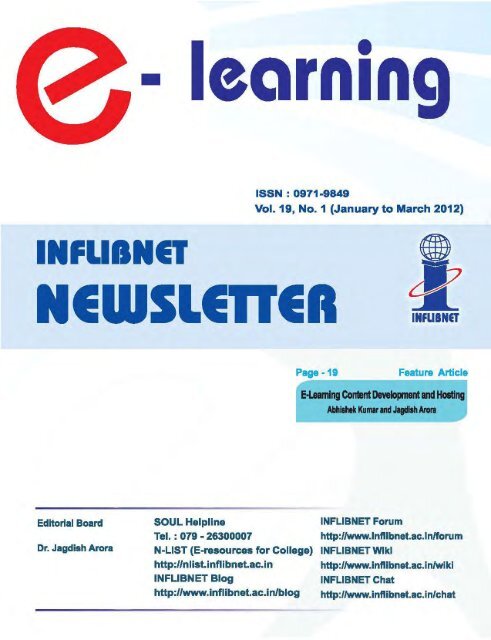
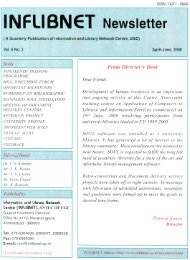

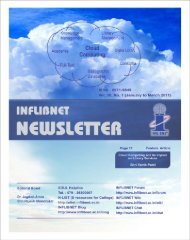
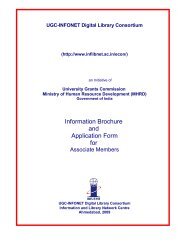
![Uni of Delhi_MA_History[1]. - INFLIBNET Centre](https://img.yumpu.com/48586372/1/190x245/uni-of-delhi-ma-history1-inflibnet-centre.jpg?quality=85)
